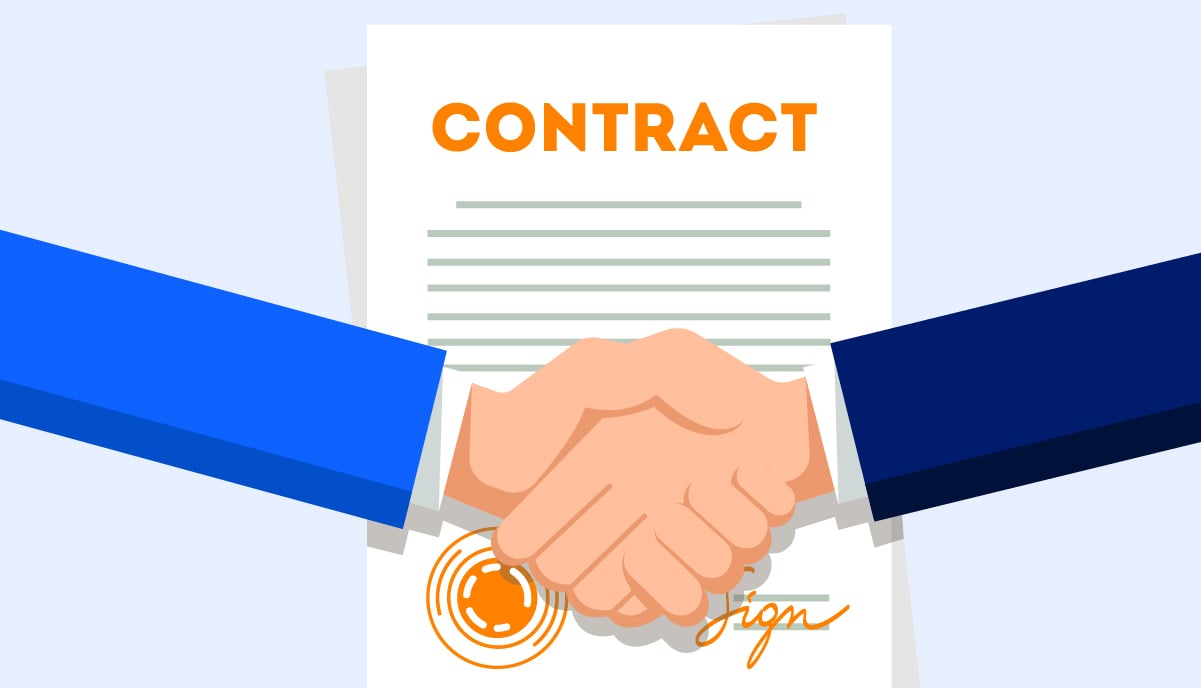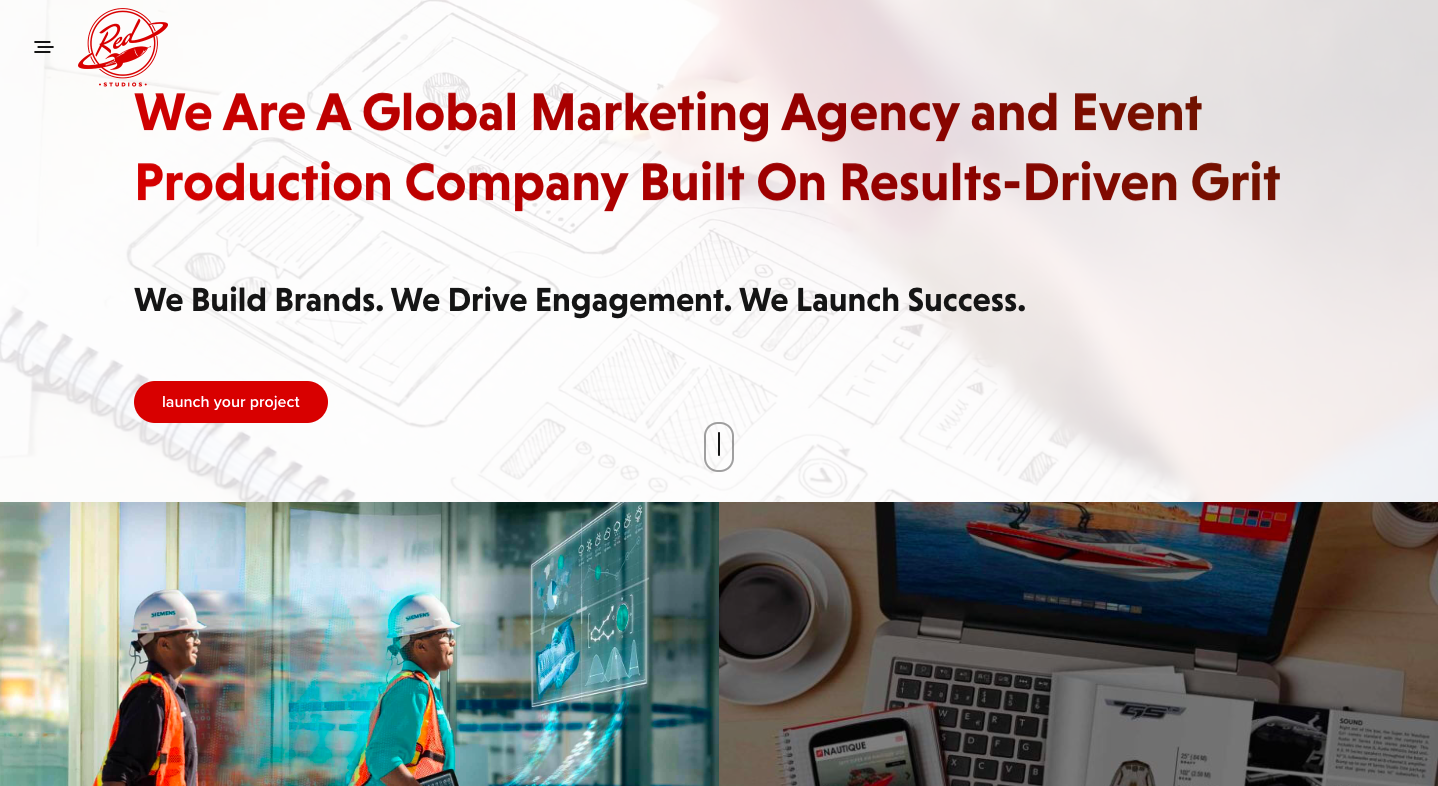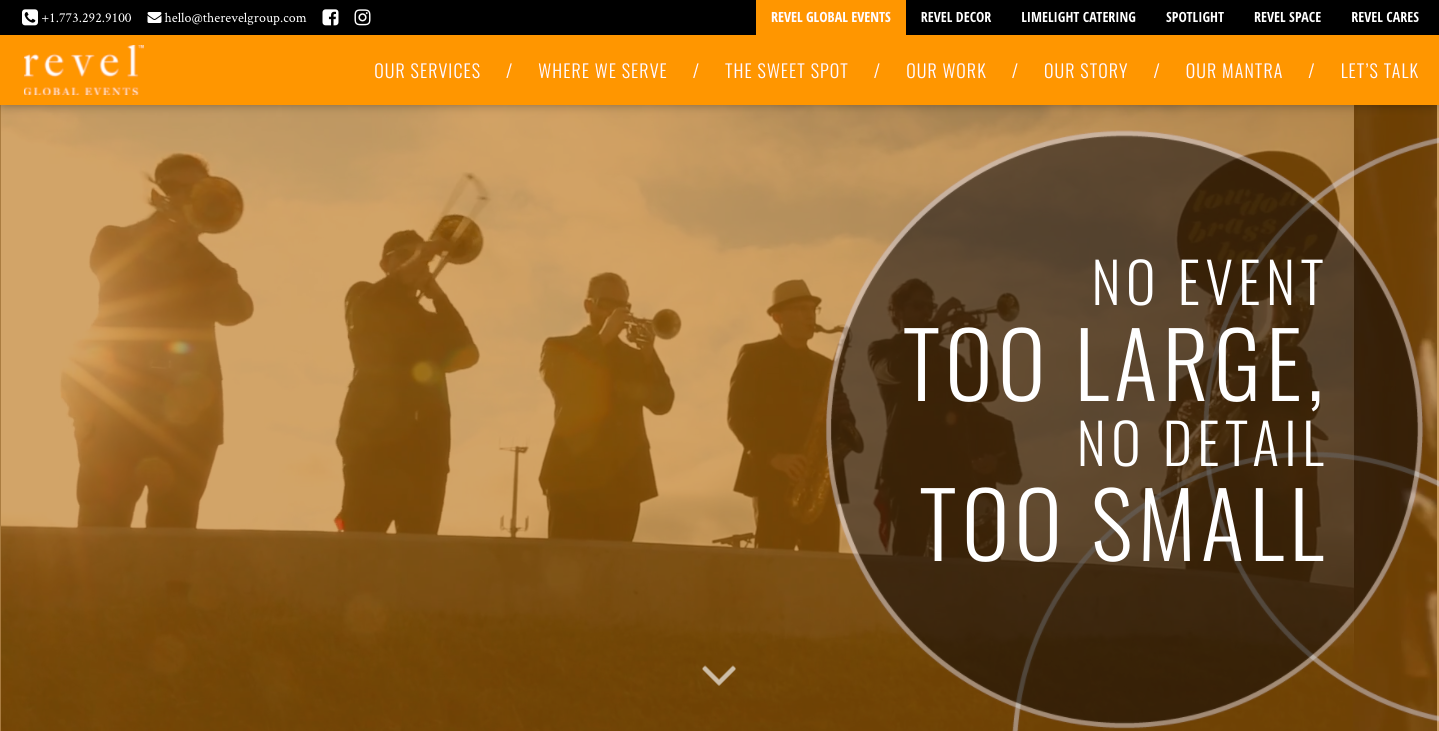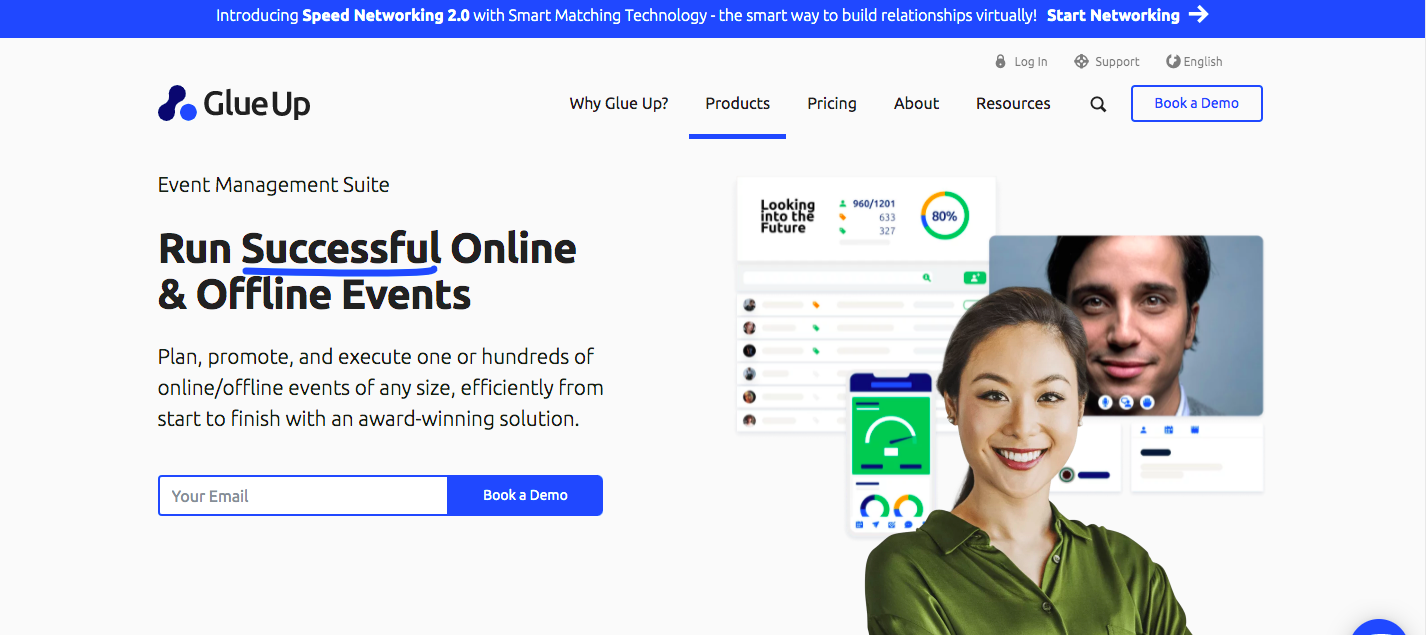
Improving event production happens during planning, execution, and post-event stages. To stand out from your competitors, it is essential to create a valuable event that can offer a unique experience to the audience.
Additionally, keep in mind that it will require more time, effort, and resources for events with mixed online and in-person audiences to succeed.
In this article, we will guide you thoroughly on how you can make the event experience memorable and meaningful by providing helpful tips and insightful recommendations, which can also help increase profits.
Quick Reads
- What Is Event Production?
- Challenges of Event Production
- The Cost of Event Production
- Factors Involved When Producing Events
- Post Event: Assessing Your Event Success
- Event Production Companies Duties & Responsibilities
- Benefits You Get When Working With an Event Production Company
- Top 5 Event Production Companies in the United States
- Use Glue Up Platform in Producing Successful Events
What Is Event Production?
Event production deals with logistics coordination before, during, and after an event takes place. It involves having the right staff to ensure the event goes off without a hitch. It can also include clients during the event production process as much or little as they would want.
Careful planning is crucial to a well-executed event. An event production team helps coordinate everything–from design to food to program. It aims to enhance an event's live, stage presence to deliver a memorable and meaningful experience to attendees. It seeks to grab and hold the audience's attention using audiovisual techniques, light technology, and unique presenters.
With the help of an event manager, it seeks to understand clients' needs, research elements related to events, and hire the right staff. In line with this, they help brief and supervise the team while monitoring the event to quickly resolve issues that may arise.
Event Planning vs. Event Management vs. Event Production
Event planning deals with the early stages of conceptualization and goes all the way to the activities managed before an event. It includes choosing a theme, developing a budget, selecting venues, finalizing event dates, planning the menu, hiring a caterer, and more.
On the other hand, event management involves managing different components of weddings, festivals, conferences, sports events, and parties. It involves registrations, managing staff, overseeing event execution, and resolving event situations on site. In short, event planners plan and prepare activities for all special events, while an event manager takes ownership for the successful event execution.
Event production is the thoughtful planning and execution that elevates an event into an experience. Working with presenters, audiovisual crew, and technology vendors, event production management teams produce and deliver unique live experiences at an event.
In addition, the live event presentation aims to impact the audience in the most meaningful way by stimulating their attention through audio, visual technologies, and unique presenters.
Pre-Production
The first step in the event production process is pre-production, which can start a few days or a month before the event. After discussing the client pitch with the team, you can develop the event planning timeline.
During the entirety of the production in the event management process, the production team has to evaluate the concept, write the script, create videos and images to support, and build the production schedule.
Keep in mind that it’s essential to book a show crew three months before the event. The production team should coordinate the schedule with technicians and ask about their availability. Another factor to consider when doing an event is budgeting–identifying the amount you have and making some adjustments if necessary.
After this, you can plan the event branding and design. List down all the costs associated with equipment and audiovisual services, among others.
Discussing presentations and collecting scripts is part of the pre-production stage to come prepared during the event. Be open to changes by asking the right questions and removing the unnecessary elements that cannot contribute to smooth event execution.
Another critical aspect of the pre-production stage is the event theme and design. You can focus on simplicity using projection screen, decor, and venue layouts if you are producing small events.
On the contrary, a large show will have a rented backdrop that gives you the freedom to get the dream event look you want–with unique hues, materials, and styles.
At this point, coordination and communication with a production company are a must. You have to give your audio, video, and lighting requirements to prepare the AV equipment you need ahead of time.
The production team should create a production schedule one month before the event. It needs to align with the arrival of AV vendor trucks, crew call time, rest and meal breaks, and program start times.
On-Site
The second step in the event production process happens only a few days before the event schedule. Once you've made arrangements with rental and staging companies, the production team should arrive on time to begin the setup and rehearsal.
Make sure to develop a checklist that contains all requirements before you begin client and tech run-through. The production company needs to state the required time here and offer your crew the necessary help and assistance.
Finalizing the production schedule and event duration while planning onsite is necessary. Typically, the entire show flow or rundown isn't built and completed until you get onsite.
Once everyone is in the staging meeting, all crew leads should discuss the show's flow one by one. At this time, they can review technical details, come up with AV cues, and talk about potential issues and ways to solve them.
After this, the team should assess their roles and perform a run-through in the venue. This is the time to include all the cues for a given show and check if they work well together.
Everything from the beginning to the end can become detailed during this period, with multiple cues being modified or changed completely. After the run-through and cue-to-cue, the production team can set another run-through rehearsal with the client so that everyone can have a clear idea of what to expect.
Show Day
The show crew should be present on show day before the event opens. This allows everyone a chance to talk and then redo the cue-to-cue. Be open to the idea of giving the client an extra rehearsal if needed. Print the latest event flow and distribute them to key players for successful event execution.
Load-Out
Load-out is the last step of the event production process. Once the event ends, the production team can dismantle the stage and equipment and begin the post-event meeting.
It may take a couple of days to pack up all the gear and move them to the vehicle. Ensure that you have the right load-in/out crew to support as you need to manage time effectively and avoid the event from slowing down.
Challenges of Event Production
No Clear Client Vision
One of the biggest challenges you can face in events is handling a client that has a vague vision that serves no purpose. It’s necessary to discuss goals and logistics with clients early on. And for you to make an event successful, you need to come up with some strategies to get the desired outcome with the production team.
If you are part of an event management company, ask your clients about the target audience, budgets, and lessons learned from past events.
You can ask the following questions to set clear expectations:
- Did you produce events in the past similar to this one?
- Have you worked with this team in the past?
- Can you show us your old cue sheets so we can check what we can get and apply?
Hire a Dependable Event Crew

Hiring event staff or crew can be challenging when most of them are already committed to other events. While understaffing poses some challenges, hiring a new crew can also entail the risk to underperform. This is the reason why producers invest in relationships with trusted crew members who are already comfortable with the work and can go the extra mile.
Last-Minute Changes to Your Event Production Schedule
There can be last-minute changes due to technical problems, changes in client requirements, and venue issues. When any of these happens, you must be resilient to challenges for you to gracefully launch the event.
When changes occur, make sure to keep the client and staff aligned. Print or send the event program via email to keep everyone updated. Otherwise, the team could miss important cues, leading to awkwardness and confusion among all participants.
The Cost of Event Production

Event production can be expensive and the total cost is determined by the event venue, equipment, number of guests, and activities you choose.
Working with an event production company or event consultant can help you plan the budget at hand and set realistic goals towards the expected outcome you seek. If money is an issue, they can also suggest some budget-friendly alternatives.
Proper budgeting is crucial to avoid overspending and financial difficulties. One option for financing an event is to get a personal loan online.
By creating a realistic budget and using a personal loan wisely, event organizers can ensure that they have the necessary resources to bring their vision to life while also minimizing financial stress.
A reliable event production team can offer assistance, especially when dealing with last-minute changes that need to be completed on schedule. When you decide to hire one, you need to know if the event production cost is suitable for your event. For this reason, basic knowledge of how companies come up with quote fees using a flat price, hourly fee, and percentage of expenses would be necessary.
Factors Involved When Producing Events
Experience
Event planners need to leave a memorable experience. Therefore, they should constantly find unique ways to improve the attendee experience by offering enjoyable and valuable events. A well-executed event attracts attention and engages attendees when they arrive at the venue.
Atmosphere
The atmosphere can enhance certain event elements, get guests excited, and leave a meaningful experience. You need to plan every aspect of the event and utilize technology to accentuate the qualities of a brand. This can also engage the audience and keep them with you during presentations, adding value to the overall event experience.
Measurability
Event organizers often use registered attendees, the number of new leads, and revenue from sponsorship to measure an event’s success. Another essential indicator is the generated leads, questions on social media, and increased followers and fans on online pages. These numbers are fundamental to encourage attendees and sponsors to participate in future events.
Value
All event elements from the invitation to the stage must be carefully thought out to make sure that they add value. Something that’s only related to the event isn’t enough if it has little or no value. So if this is the case, better remove them instead.
Mood and Emotion
Event producers should adjust sound and venue lighting at different stages throughout the event. By strategically playing music, event production companies can enhance the mood and improve the guest experience. This can also ensure that the audience is fully immersed in the event, leaving lifelong memories for them to remember the brand.
Post Event: Assessing Your Event Success
Return on Investment and Return on Objectives
Organizations need to determine if they appropriately allocated resources and maximized budget to ensure event success. If you are an event production that wants to demonstrate commitment and bring value to clients, remember to keep this in mind.
Meanwhile, you can use another approach when evaluating production services by considering return on objectives or ROO. Collecting and analyzing this data provides valuable feedback for clients, making recommendations on improving event planning, production, and execution in the future.
Importance of Post-Event Reporting for Production Teams
Post-event reporting provides an opportunity to assess learning, inform decisions and adjust strategies after seeing any inefficiencies during the event. Recognizing these aspects allows the team to enhance the process and produce more successful events for clients in the future.
You need thoughtful planning when producing a well-written post-event report. If you want to write a successful post-event wrap-up report, follow these helpful, professional tips:
- Schedule time to write and set publishing date for the report within 48 hours after event launch.
- Always take down notes during a meeting.
- Attach photos, audio, and videos to help complement the post and create more engagement.
- Include vital stats to add credibility to the post.
- Make sure to thank event sponsors, guests, and other volunteers.
Event Production Companies Duties & Responsibilities
Event production companies organize processes much easier and more efficiently. They ensure that the event runs smoothly from planning to execution. They offer services to support your requirements before, during, and after your event. In line with this, they can contact, hire, or coordinate the right people and equipment for the event. They decide on transportation needs and solve location or travel issues in anticipation for guests as well.
Services Event Production Companies Offer
Event Management and Coordination
Event production companies oversee important tasks and deliverables throughout the event planning process. They meet and discuss with vendors at the venue location to help set up the stage, look for supplies and decorations, and manage staff to ensure the completion of a well-executed event.
Audio Visual Services
Production and stage staff can offer services that cover different venue types and presentation styles–may it be concerts, sporting events, or festivals. Depending on the event size, they provide the most suitable equipment, installation specifications, and operational support. Additionally, they can include complete audio, lighting, video, and staging solutions or services to add value to the existing setup.
Video Production Services
They film events and areconsidered specialists when using minimal crew to maximum effect. Produced event videos can stand out and capture attention because they can easily adapt their videography style to reflect the event’s atmosphere. These events can range from award ceremonies, conferences, publicity events, team building, launch parties, and more.
Video Conferencing and Live Broadcast
Event planners can use video conferencing and include at least three or more physical locations in a single event. These are called multi-site events, which allow an organization to communicate an important message to large groups simultaneously.
They are considered powerful during a product launch or organizational announcement. To make the most out of multi-site events, content should be focused on meaningful messages and all locations should be relevant to them.
Set Design
They are also responsible for an event’s visual production. They pick a design style for sets, locations, graphics, props, staging, camera angles, lighting, and wardrobe while working closely with the event producer and manager.
Venue Sourcing and Negotiating the Right Contract

Finding a venue for your next event can be time-consuming. With the help of event companies, they can contact the venue and ask for the information you need. They collate everything and propose them to you in a simple format. They help you save you time by assigning a team that can check availability, offer the best advice for your event’s location and venue and all other options you might need before signing the contract.
Benefits You Get When Working With an Event Production Company
Event management professionals can easily conceptualize an event’s theme using originality and creativity. They will suggest multiple ideas from their own experience, improving corporate event experience.
In line with this, their vast knowledge of catering and venues can remove the leg work out for you. You will feel more confident with nothing to worry about until the event begins. This lets you focus on other tasks, including welcoming VIP guests and assisting other attendees if needed.
Types of Events an Event Production Company Produces
Televised Events and Broadcasts
Event production companies are experts in audiovisual technology. So when it comes to televised events and broadcasts, everything is timed down to the last second to avoid errors. The best event production companies can predict miscues and plan ahead to deliver an event smoothly.
Live Sporting Events
The production team’s primary goal during the game is to get the audience excited. However, you can encounter challenges due to timing during a live game. The ability to react well during live games, rearrange elements last second, or even add other items like a script is essential.
Corporate Event Production

Corporate events like conferences and trade shows can raise brand awareness to attract new customers. As an event production company, discuss with clients the exact goals and how you can implement strategies and learnings from past events to address anticipated issues dealing with engagement, employee retention, and more.
In addition, it’s your primary duty to help clients increase their ROI. If you’re launching a corporate event, utilize it sufficiently to measure and maximize clients’ ROI, making them stay to continue business with you.
Top 5 Event Production Companies in the United States
1. Red Rocket Studios

Red Rocket Studios has produced almost all types of events for different brands and corporations. It’s an end-to-end event management company that can manage all aspects of event production.
2. Ashfield Event Experiences

Ashfield Event Experiences is a leading global event agency that can plan and manage events so everyone can focus on making the most of what’s important: embracing the event experience.
3. Revel Global Events

From event planning to execution, Revel Global Events' team of experts and enthusiasts work hard to bring event goals to life while using creativity along the way.
4. Tom Bercu Presents

Tom Bercu Presents has produced events for elite groups and large-scale productions. The company has a diverse clientele ranging from non-profit organizations to Fortune 500 global brands.
5. AV Chicago

Whether you have a small event, large conventions, conference kick-off party, or anything in between, AV Chicago can help produce inspiring and memorable audio and lighting events.
Use Glue Up Platform in Producing Successful Events
If you want to automate your next event to increase event attendance and productivity, book a demo of Glue Up's Event Management Software.

Our all-in-one platform for events has customizable registration forms, event website builder, an online ticketing payment system, and digital business cards that are easy to use, especially for managing and promoting events.



